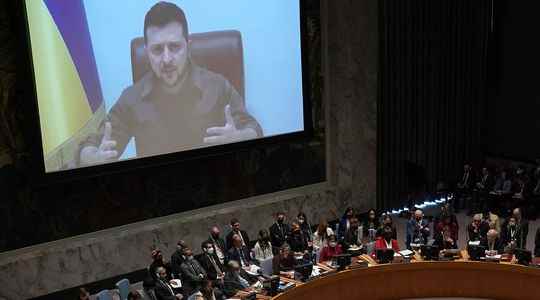Like a boxer who tirelessly maintains his opponent’s gaze, Volodymyr Zelensky does not hold back his blows when he speaks publicly. “The Russian right to veto is a right to kill (…) Russia must be held responsible for war crimes”… After the discovery of the gruesome images of Ukrainian roads littered with corpses on the outskirts of kyiv which moved world opinion, the president strongly called on the United Nations Security Council on Tuesday to suspend Russia from the international body’s Human Rights Council. Seven weeks after the start of a war precipitated by the Russian army’s military invasion of Ukraine, displacing nearly 10 million people and killing at least 30,000 men according to the latest figures shared by NATO, the charge by the Ukrainian leader reminds us of a question that occupies the experts of the television sets as much as it agitates the corridors of the chancelleries: what can the UN do to limit the furious offensive orchestrated by Vladimir Putin?
One of the ways that the institution has chosen to influence the conflict is indeed that advocated by Volodymyr Zelensky. This Thursday, the UN General Assembly adopted the suspension of Russia from the Human Rights Council (the vote received 93 votes in favor, 24 against and 58 abstentions). This was demanded in a joint statement by the G7 countries on Thursday. “We are convinced that the time has come to suspend Russia’s membership of the Human Rights Council,” the power grouping said. The United States and Ukraine welcomed the vote. It puts an end to several days of debate on the role of the UN institution.
The institution of all regimes
The revelation of the existence of corpses piling up on the edges of abandoned dwellings in the regions of Ukraine most affected by the fighting left people wondering about the usefulness of the UN Security Council in the face of to the escalation of violence. For Volodymyr Zelensky, allowing Russia to remain within the UN circle would amount to burying the relevance of the United Nations. An interpretation that Bertrand Badie, teacher-researcher specializing in questions of international regulation at Sciences Po Paris, judges contrary to the mission of the organization: “I would say here that there is an error in meaning. The essence of multilateralism is to represent all the regimes. One does not become a member of the UN Security Council as a distinguished defender of human rights but as a member of an international community which does not have to wonder on the nature of regimes.
His colleague, Guillaume Devin, university professor specializing in the sociology of international relations shares the observation. “The Security Council is an institution of dialogue, a kind of global board. If we dismiss a power, however infrequent it may be, we risk weakening the regulatory bodies, he explains. Even if we have to suffer the lies and blockages of one of the parties, it is better that this party is at the heart of the diplomatic game. Outside, the risks of destruction are even greater.”
“The Exclusion Argument”
Bertrand Badie especially sees in the exit of the Ukrainian president the illustration of what he called “the argument of exclusion” at work since the beginning of the war. President Zelensky has repeatedly called for Russia to withdraw from a number of international organisations. Russian banks no longer have access to the Swift monetary system, the Russian football team has been banned from the next World Cup and several oligarchs have been deprived of their assets and their titles within the European Union. “The message is clear: ‘if you don’t stop your aggression, we exclude you from the world'”, sums up Bertrand Badie. But this strong deterrent weapon has borders
“There are places where exclusion is counterproductive, withdrawing Russia from any political consultation means cutting all the threads of exchanges, contact, negotiation. It’s dangerous!”, warns Bertrand Badie . In short, isolating Russia means no longer having any means of reasoning with its decision-makers. This no doubt explains why no country has so far followed in the wake of Volodymyr Zelensky’s declaration. It is also that the operation looks like an impossible mission. To exclude a member of the Security Council, the United Nations Charter would have to be revised. Possible thanks to article 108. Only it supposes upstream a unanimous vote of the permanent members. Which Russia will oppose, of course. “The debate is closed”, slice Bertrand Badie. Maybe not, however.
Resolution 377
“Adopted during the Korean War, resolution 377 made it possible to pass the question of peacekeeping from the hands of the Security Council to those of the United Nations General Assembly, details, for his part, Guillaume Devin. can therefore, thanks to this precedent, take initiatives to sanction or even exclude leaders or institutions. In the context of the war in the Democratic Republic of the Congo, the General Assembly had shown itself to be particularly offensive in order to weaken the warlords. This time, the operation comes up against a power possessing nuclear weapons, which makes its pursuit more perilous.
Faced with these delicacies, another means of pressure existed for the United Nations. Exclude Russia from the Human Rights Council. “We are convinced that the time has come to suspend Russia’s membership of the Human Rights Council”, supported the G7 on Thursday. Only the Libya of Muammar Gaddafi had been suspended in 2011 from this body.
“The debate that will take place will specify how the council reads its role”, said Bertrand Badie just before the vote. Beyond the case of Russia, the question posed by the war in Ukraine is also: do you have to be a pure country to sit on these councils?” The UN seems to have provided a first element of an answer.
